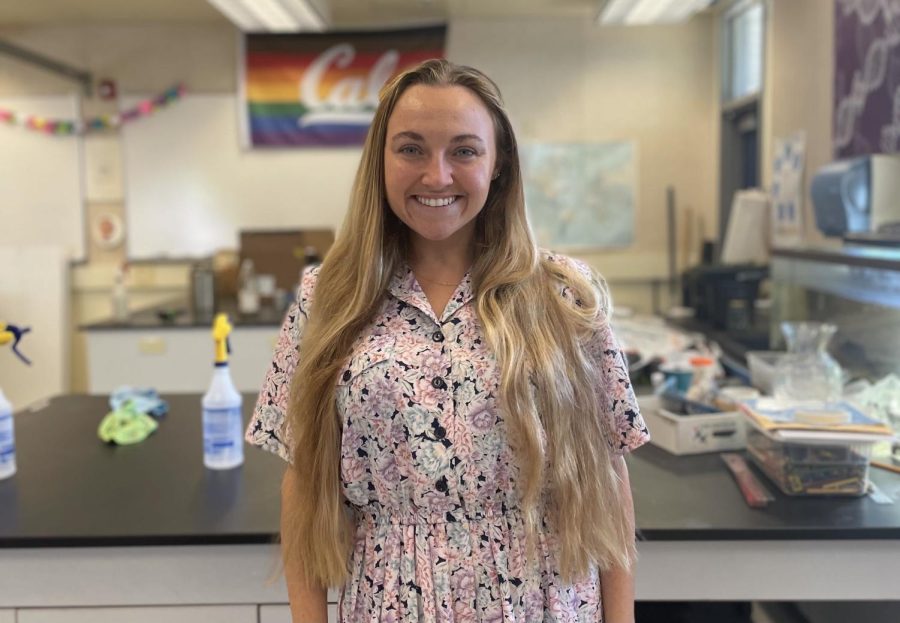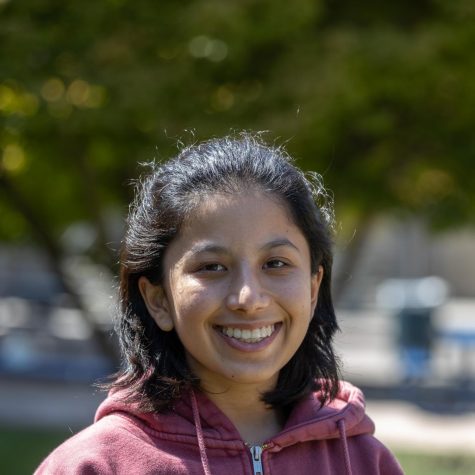New science teacher Elizabeth Pyle finds the joy in science
New teacher Elizabeth Pyle in her classroom. Pyle’s standout quality is how she strives to help students find the fun in science and learning in general, making her classroom a vibrant and energetic place to be.
Although her ID reads “Elizabeth Pyle,” she is “Ms. Lizzy” to students—a nickname reminiscent of Ms. Frizzle from the TV show “The Magic School Bus,” and indicative of her personality and teaching style. The first thing you’ll notice upon meeting the new biology and honors biology teacher is her enthusiasm, which certainly left an impression upon head of science department Darren Dressen in her applicant interview.
“You couldn’t walk into a room and not be happy around her,” he said.
A recent college graduate — she earned her bachelors in Environmental Science from the University of California, Berkeley in 2021— she tries to be the teacher she needed in high school.
She understands that most students don’t have the attention span to sit through a block period, so she mixes up the kinds of activities they do, incorporating art, reading and research into her lessons, supporting students’ different learning styles in the process.
“It’s great to spark joy and be like, ‘let’s make a collage of this biome, or let’s map out this food web, or let’s think about these different types of cells and where we could find that,’” Pyle said.
Pyle is honest about her class structure; if a lesson might be more boring one day, there’s probably a long-term benefit that she’ll communicate to her students. In general, her rule of thumb is: if I was in their shoes, could I do it?
Pyle tries to remember that every student comes into her class with different experiences. Perhaps a student had a terrible experience with middle school science, and needs more coaxing to enjoy high school science. Maybe a student is in the middle of a mental health crisis, or simply is having a bad day. Others may have been heavily impacted by COVID-19. Whatever the situation, she tries to meet her students in the middle and find what approach or support “clicks” for them.
Sophomore Ace Fenner often spends ACT in Pyle’s room, where Pyle will sometimes walk around the class and check in with students, helping them with any kind of work they need assistance in.
“Let’s work together,” she stressed. “I’m not a robot, I’m a human being.”
In fact, her young age often reminds students of her humanity and puts them at ease.
“She’s on the same level as [the students] in terms of language,” Dressen observed, recalling her saying phrases such as “not that it makes me salty” or “juicy info.”
“I know the memes!” Pyle said, laughing.
The tone is immediately set upon entering her class each day, as she plays music from a student-curated playlist. She’ll play Lo-fi beats from a YouTube playlist during work times.
“I think it’s really important to walk a line between being young and relatable, and then using that to my advantage to get them to care about science and enjoy my class,” Pyle said.
Ace noted that Pyle’s age puts them at ease. “I feel like I can actually ask her questions,” Ace said.
Pyle urges her students to see the science in the world around them and the diverse ways in which they can learn and connect with the subject.
“[Science] is something that doesn’t go away,” Pyle said. “You could never take another science class in your life, and you’re still going to see and experience science literally 24/7 within your body, outdoors and within your car.”
If you’re going to study science, the Bay Area—with its unique Mediterranean climate and combination of mountains, plains, the ocean and the bay—is the place to be. Pyle cites her childhood spent camping and hiking along the Half Moon Bay coast, in addition to an influential AP Environmental Science teacher, as the reasons why she majored in environmental science.
“I was like, ‘Wow, this is really special,’” Pyle said. “And I want to learn more about the world around me.”
She wrote her thesis on chytridiomycosis, an amphibian fungal disease. With in-person research being unavailable because of COVID-19, Pyle still tracked the disease and made policy recommendations about amphibian pet trade regulation and pathogen testing, working with the Museum of Vertebrate Zoology in Berkeley.
In high school, she interned as a Climate Action and Education fellow with the Alliance for Climate Education. As a Bay Area native, Pyle is particularly attuned to changes in climate that have occurred over the past 10 years.
“The weather’s a little bit hotter, it’s a little less foggy in Half Moon Bay—and it’s always foggy in Half Moon Bay.”
Although Pyle says seeing these changes is alarming, “it makes you want to get more involved.”
Pyle stresses that there are lots of ways students can get involved in science and the world around them that go beyond the popular vision of a scientist as a stoic, lab coat-clad mastermind.
“I think what can be really intimidating for students is they think ‘I need to be some big, formal scientist, this is all really serious’ when really, you could just be enjoying the subject more casually,” she says. She pointed out that science needs artists and communicators, not just data nerds and lab rats.
It’s clear that out of all the professions out there, Pyle chose teaching because she loves it.
“I have so many friends who just sit in an office job all day, and they’re just counting down the minutes,” Pyle said.
Yet by the end of our interview—having cycled through her passion for amphibians, her concern about climate change, her awe of the world and most of all, her passion for her students—her smile is bigger than ever.
“I have no poker face,” she said.





Diane Geri Sullivan | Oct 18, 2022 at 1:51 am
You are a talented writer. Wow, Ms. Lizzy sounds like an awesome teacher but I already knew that because I’m her mother. I’m just saying…..